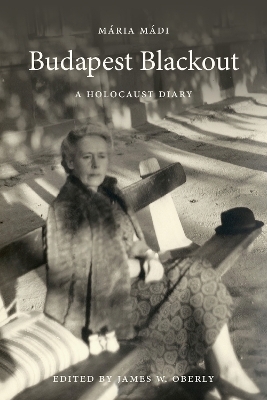
Budapest Blackout
A Holocaust Diary
Seiten
2023
University of Wisconsin Press (Verlag)
978-0-299-34310-1 (ISBN)
University of Wisconsin Press (Verlag)
978-0-299-34310-1 (ISBN)
- Lieferbar (Termin unbekannt)
- Versandkostenfrei innerhalb Deutschlands
- Auch auf Rechnung
- Verfügbarkeit in der Filiale vor Ort prüfen
- Artikel merken
Transcribes a selection of Maria Madi’s writings focusing on the period of March 1944 to November 1945, from the Nazi invasion and occupation of Hungary, through the Battle of Budapest, to the ensuing Soviet occupation.
MÁria MÁdi (1898–1970) was a Roman Catholic Hungarian physician living in Budapest during World War II. Stuck in the city, she vowed to become a witness to events as they unfolded and began keeping a diary to chronicle her everyday life, as well as the lives of her Jewish neighbors, during what would be the darkest periods of the Holocaust. From the time Hungary declared war on the United States in December 1941 until she secured an immigrant’s visa to the US in late 1946, she wrote nearly daily in English, offering current-day readers one of the most complete pictures of ordinary life during the Holocaust in Hungary. In the form of letters to her American relatives, MÁdi addressed a wide range of subjects, from the fate of small countries like Hungary caught between the major powers of Germany and the Soviet Union, to the Nazi pogrom against Budapest’s Jews, to family news and the price of food.
MÁdi’s family donated the entire collection of her diaries to the US Holocaust Memorial Museum. This edition transcribes a selection of MÁdi’s writings focusing on the period of March 1944 to November 1945, from the Nazi invasion and occupation of Hungary, through the Battle of Budapest, to the ensuing Soviet occupation. While bearing witness to the catastrophe in Hungary, MÁdi hid a Jewish family in her small flat from October 1944 to February 1945. She received a posthumous Righteous among Nations Medal from Yad Vashem, the World Holocaust Remembrance Center.
Editorial commentary by James W. Oberly situates MÁdi’s observations, and a critical introduction by the Holocaust scholar AndrÁs LÉnÁrt outlines the wider sociopolitical context in which her diaries gain meaning.
MÁria MÁdi (1898–1970) was a Roman Catholic Hungarian physician living in Budapest during World War II. Stuck in the city, she vowed to become a witness to events as they unfolded and began keeping a diary to chronicle her everyday life, as well as the lives of her Jewish neighbors, during what would be the darkest periods of the Holocaust. From the time Hungary declared war on the United States in December 1941 until she secured an immigrant’s visa to the US in late 1946, she wrote nearly daily in English, offering current-day readers one of the most complete pictures of ordinary life during the Holocaust in Hungary. In the form of letters to her American relatives, MÁdi addressed a wide range of subjects, from the fate of small countries like Hungary caught between the major powers of Germany and the Soviet Union, to the Nazi pogrom against Budapest’s Jews, to family news and the price of food.
MÁdi’s family donated the entire collection of her diaries to the US Holocaust Memorial Museum. This edition transcribes a selection of MÁdi’s writings focusing on the period of March 1944 to November 1945, from the Nazi invasion and occupation of Hungary, through the Battle of Budapest, to the ensuing Soviet occupation. While bearing witness to the catastrophe in Hungary, MÁdi hid a Jewish family in her small flat from October 1944 to February 1945. She received a posthumous Righteous among Nations Medal from Yad Vashem, the World Holocaust Remembrance Center.
Editorial commentary by James W. Oberly situates MÁdi’s observations, and a critical introduction by the Holocaust scholar AndrÁs LÉnÁrt outlines the wider sociopolitical context in which her diaries gain meaning.
James W. Oberly is a professor emeritus of history at the University of Wisconsin–Eau Claire.
List of Illustrations
Preface by Christina Blankinship Harrell
Editor’s Introduction by James W. Oberly
A Critical Introduction by AndrÁs LÉnÁrt
Dramatis Personnae
Prologue, December 1941–February 1944
1. The Invasion and Occupation of Hungary, March 1944
2. The Holocaust in Hungary and the Air War, April–July 1944
3. Hungary Tries to Leave the War, July–October 1944
4. Arrow Cross Coup and Nazi Terror, October–November 1944
5. The Battle of Budapest, December 1944–February 1945
6. Soviet Occupation: Looting, Rape, and Waiting, February 1945
7. Postlude to the Battle of Budapest: March–November 1945
| Erscheinungsdatum | 14.07.2023 |
|---|---|
| Zusatzinfo | 22 b-w illus. |
| Verlagsort | Wisconsin |
| Sprache | englisch |
| Maße | 152 x 229 mm |
| Gewicht | 272 g |
| Themenwelt | Literatur ► Biografien / Erfahrungsberichte |
| Literatur ► Briefe / Tagebücher | |
| Literatur ► Essays / Feuilleton | |
| Geschichte ► Allgemeine Geschichte ► 1918 bis 1945 | |
| Geisteswissenschaften ► Geschichte ► Regional- / Ländergeschichte | |
| ISBN-10 | 0-299-34310-3 / 0299343103 |
| ISBN-13 | 978-0-299-34310-1 / 9780299343101 |
| Zustand | Neuware |
| Informationen gemäß Produktsicherheitsverordnung (GPSR) | |
| Haben Sie eine Frage zum Produkt? |
Mehr entdecken
aus dem Bereich
aus dem Bereich
ein Psychologe erlebt das Konzentrationslager
Buch | Hardcover (2024)
Kösel (Verlag)
22,00 €
Belzec, Sobibór, Treblinka und die Aktion Reinhardt
Buch | Softcover (2023)
C.H.Beck (Verlag)
16,00 €


